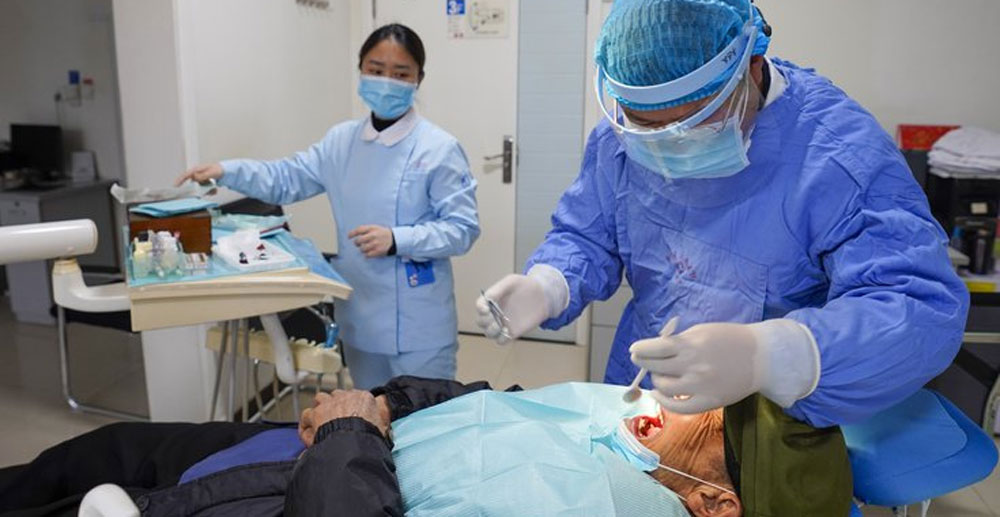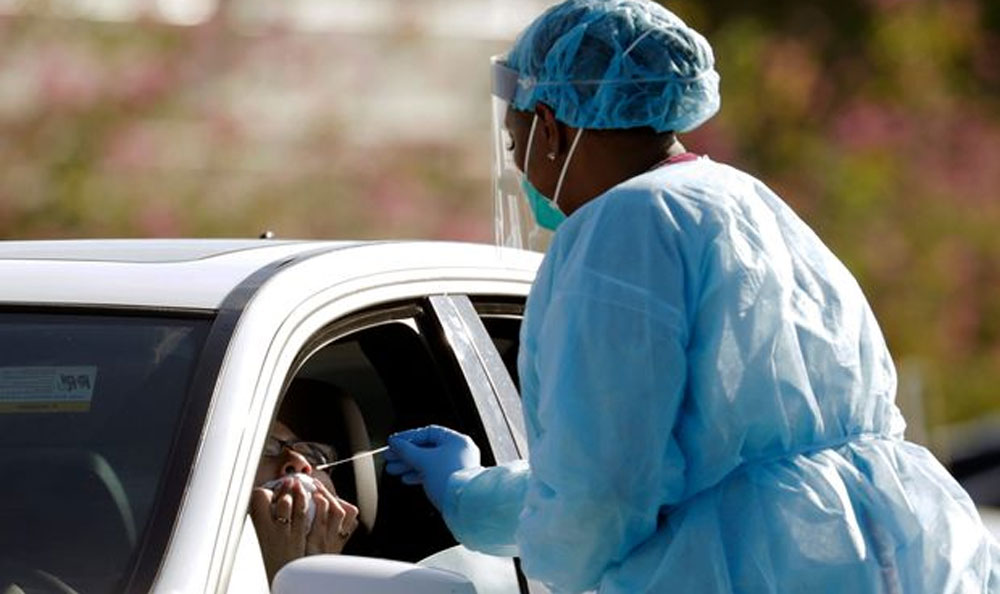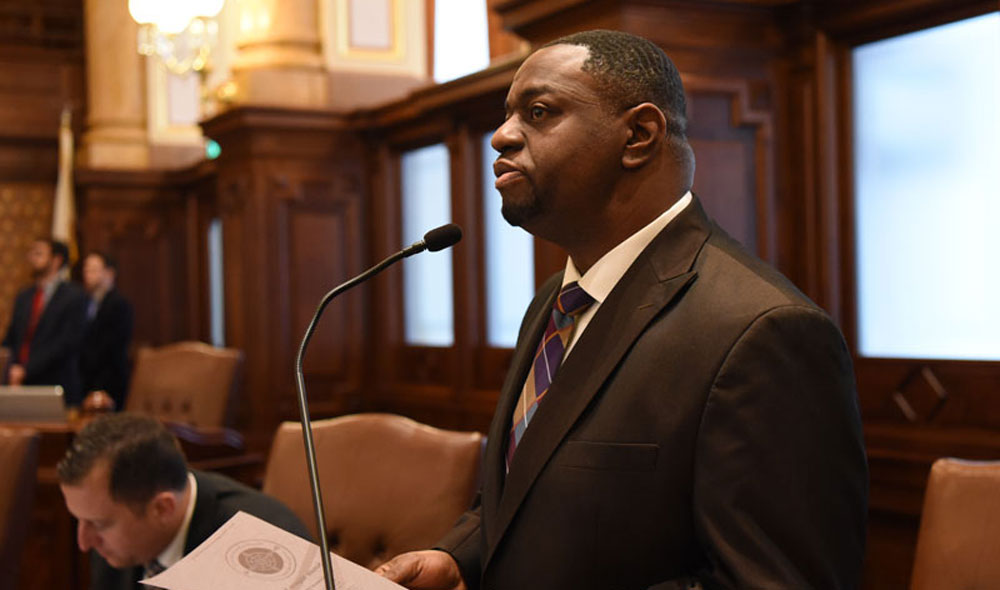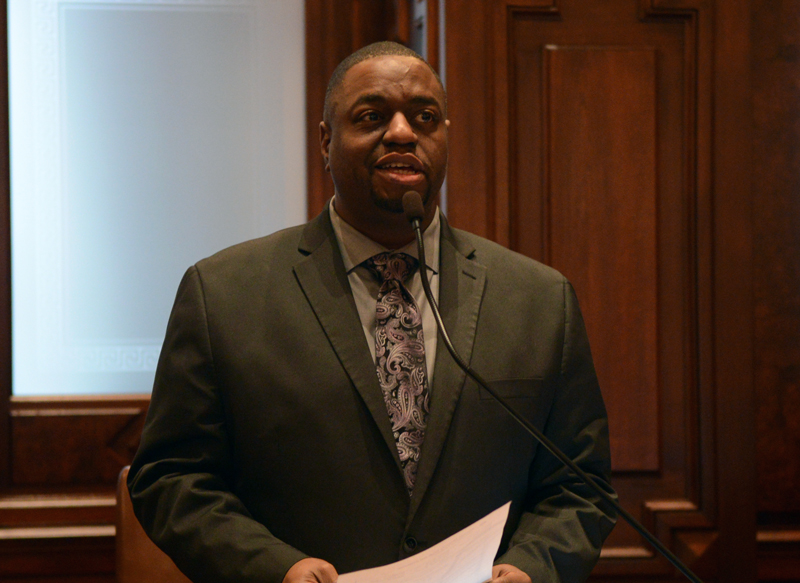- Details
- Category: Senator Emil Jones III News
 CHICAGO – The state budget for the next fiscal year will increase funding to senior services to help some of the most vulnerable Illinoisans cope during the COVID-19 crisis, State Senator Emil Jones, III (D-Chicago) announced Wednesday.
CHICAGO – The state budget for the next fiscal year will increase funding to senior services to help some of the most vulnerable Illinoisans cope during the COVID-19 crisis, State Senator Emil Jones, III (D-Chicago) announced Wednesday.
“This pandemic has affected senior citizens harder than any other age group,” Jones said. “They are at more risk of contracting the disease and family members have had to limit in-person visits to decrease risk of exposure. This budget provides additional funding to ensure seniors have the services they need and to try to make social isolation a litter easier for them.”
To offer much-needed assistance to struggling seniors during and after the COVID-19 pandemic, the budget provides $201.7 million in additional funding to the Illinois Department on Aging.
This includes $1 billion in support for the Community Care Program, which provides cost-effective alternatives to nursing home placement and helps seniors maintain their independence. As long-term care facilities account for a disproportionate number of COVID-19 deaths across the country, programs that enable older adults to remain at home may save lives.
The funds will also allow the Department on Aging to continue to offer home-delivered meal services and run the Senior HelpLine, which connects older adults and caregivers with local programs and services. In addition, the budget increases funding to Adult Protective Services to expand efforts to prevent abuse, neglect and financial exploitation of older adults.
Area Agencies on Aging will receive an additional $1.2 million to provide community-based services to seniors at a local level.
“Tasks as simple as grocery shopping can be a risk for some seniors, so I encourage them to take advantage of services, like Meals on Wheels,” Jones said. “Seniors need to know we have their back and Illinois wants to ensure they stay safe during this time.”
- Details
- Category: Senator Emil Jones III News
 CHICAGO – State Senator Emil Jones, III is pleased to learn the Illinois Department of Public Health has updated its guidance on allowing dental providers to resume routine oral and dental care beginning this week.
CHICAGO – State Senator Emil Jones, III is pleased to learn the Illinois Department of Public Health has updated its guidance on allowing dental providers to resume routine oral and dental care beginning this week.
“Regular dental visits are essential because they help keep your teeth and gums healthy, which is why I am pleased to see IPDH allowing dentist to resume routine oral care on urgent patients,” Jones (D-Chicago) said. “Dental offices will have to follow health guidelines, so if you are in need of a dental treatment, I suggest you give your dentist a call.”
IDPH says to yield good procedural outcomes, oral health providers should consider their patient's health care needs, assess the risks and benefits of any procedures, and appropriately screen patients for COVID-19. Patients will need to be symptom free and have their temperature taken. Dentists will need to address their use of masks, face guards, and suction devices.
Dentists gave up their PPE in the early days of the pandemic for hospitals, first responders and nursing homes. Now they have difficulty getting what they need to resume dental care.
“Patients have been waiting to get back to their dentists and, even though now we have the green light from the IDPH, we are in need of PPE to meet their guidelines,” said Dave Marsh, Director of Governmental Affairs with the Illinois State Dental Society. “Of course, we recognize the highest priorities for PPE in health care settings, but we will be seeking a higher priority for masks and face shields for our profession.”
More details from IDPH are here.
- Details
- Category: Senator Emil Jones III News
 CHICAGO — In an effort to help people struggling to pay their student loans during the unprecedented economic challenges facing the state and country, State Senator Emil Jones, III highlighted relief options that could benefit nearly 140,000 Illinoisans.
CHICAGO — In an effort to help people struggling to pay their student loans during the unprecedented economic challenges facing the state and country, State Senator Emil Jones, III highlighted relief options that could benefit nearly 140,000 Illinoisans.
“Paying student loan debt is not an essential matter when borrowers are experiencing pay cuts,” Jones (D-Chicago) said. “This is an obstacle borrowers do not need during this tough time. I recommend they contact their loan provider and see if their payments can be waved through the duration of this crisis.”
Under the initiative, spearheaded by Gov. JB Pritzker and Secretary Deborah Hagan of the Illinois Department of Financial and Professional Regulation, people with commercially-owned Federal Family Education Program Loans or privately held student loans who are having a hard time making their payments due to COVID-19 will be eligible for expanded relief.
Borrowers who need assistance are asked to immediately contact their student loan provider to set up a plan.
Relief options are based on a person’s individual needs and include:
- Providing a minimum of 90 days of forbearance,
- Waiving late payment fees,
- Ensuring that no borrower is subject to negative credit reporting,
- Ceasing debt collection lawsuits for 90 days, and
- Working with borrower to enroll them in other borrower assistance programs, such as income-based repayment.
If a person is having problems contacting their student loan servicer, they can contact the Illinois Department of Financial and Professional Regulation Division of Banking at 217-785-2900 or the attorney general’s student loan helpline at 1-800-455-2456.
- Details
- Category: Senator Emil Jones III News
 CHICAGO – To address the health disparities in minority neighborhoods, State Senator Emil Jones, III (D-Chicago) announced more COVID-19 testing sites on the Southside and Westside of Chicago.
CHICAGO – To address the health disparities in minority neighborhoods, State Senator Emil Jones, III (D-Chicago) announced more COVID-19 testing sites on the Southside and Westside of Chicago.
“Since the start of this pandemic, Roseland — an already underfunded hospital — has been the only health care facility providing walk up and drive in testing for COVID-19 on the Southside of Chicago,” Jones said. “This has really shown the lack of testing in the predominantly black neighborhoods. I appreciate Gov. Pritzker taking steps to address this issue and providing vital resources to our district.”
Pritzker announced a partnership between Ann & Robert H. Lurie Children's Hospital of Chicago and four Federally Qualified Health Centers on Chicago’s West and South Sides that will expand testing in these communities to an additional 400 tests per day. The expansion includes three locations in Illinois’ Metro East to assist communities in East St. Louis and the surrounding region, and another facility in the Markham-Harvey area of the South Suburbs.
Chicago Mayor Lori Lightfoot brought attention to racial disparities in the number of deaths due to coronavirus, pointing out that 72% of the city’s fatalities were African-Americans. She was one of the first government leaders to address the “death gap,” a topic now being discussed across the nation and world.
“It’s not shocking that there are disparities in the African-American communities. There were health gaps way before this crisis happen,” Jones said. “My concern is that these resources need to continue to be in these communities after this crisis is over.”
For more information or access to additional resources, please contact Senator Jones district office at 773-995-7748 or email here.
- Details
- Category: Senator Emil Jones III News
 CHICAGO – State Senator Emil Jones, III announced Tuesday that eligible SNAP recipients will receive additional benefits beginning this week.
CHICAGO – State Senator Emil Jones, III announced Tuesday that eligible SNAP recipients will receive additional benefits beginning this week.
“All families, especially ones with low-incomes, need support more than ever,” Jones (D-Chicago) said. “Many people were laid off their jobs, so it’s essential for them to know that they have more funds to still feed their families during this pandemic.”
More than 450,000 Illinois residents will receive additional Supplemental Nutrition Assistance Program (SNAP) benefits. The increased amount will automatically load onto their link cards. Link card holders do not need to call or visit an office. All new applications authorized in April will also receive the maximum allotment for their household size.
SNAP households that are not currently receiving the maximum allowance will receive additional SNAP benefits. Households already receiving the maximum benefit will not receive additional benefits.
Maximum amounts per household size:
|
Number in SNAP household |
Maximum benefit |
|
1 |
$194 |
|
2 |
$355 |
|
3 |
$509 |
|
4 |
$646 |
|
5 |
$768 |
|
6 |
$921 |
|
7 |
$1,018 |
|
8 |
$1,164 |
|
Each additional person |
Add $146 |
Illinois SNAP recipients receive their benefits at different times each month, so increased SNAP benefits will be loaded on different dates for SNAP recipients.
Jones urges residents with questions or concerns to give his office a call at 773-995-7748.
- Details
- Category: Senator Emil Jones III News
 SPRINGFIELD – State Senator Emil Jones, III (D-Chicago) announced Monday the expansion of support to childcare workers and other essential workers during the COVID-19 pandemic.
SPRINGFIELD – State Senator Emil Jones, III (D-Chicago) announced Monday the expansion of support to childcare workers and other essential workers during the COVID-19 pandemic.
“Essential workers do not have the luxury of staying home during this crisis,” Jones said. “Doctors and nurses are working day in and day out so it’s important these childcare centers are sustained to support these essential employees."
All essential workers in health care, human services, essential government services, and essential infrastructure now qualify for the state’s Child Care Assistance. Most of the expenses of emergency childcare centers and homes will be covered. This expansion of eligibility includes those working as nurses and doctors, supporting staff in hospitals, grocery store clerks and food producers.
Read more: Jones announces additional support to essential workers
- Details
- Category: Senator Emil Jones III News

SPRINGFIELD – Legislation sponsored by State Senator Emil Jones III (D-Chicago) that will increase access to apprenticeship programs in the construction industry for African Americans was signed into law.
Jones's legislation creates the Bureau on Apprenticeship Programs within the Illinois Department of Labor and creates an advisory board of 12 legislators (three from each caucus, appointed by the caucus leader). The goal of the commission is to increase minority participation in apprenticeship programs.
“This law will ensure African Americans have equal access to apprenticeship programs so that they can earn a more suitable living wage,” Jones said. "Most importantly, this is the first step in providing a better foundation for minorities to obtain an exceptional career in the construction industry."
Illinois' workforce stands at about 6 million, and there are about 16,000 active apprenticeships in the 13 basic crafts in the state's 102 counties.
Senate Bill 534 takes effect on Jan. 1, 2020.
Page 5 of 5













 © 2026 Illinois Senate Democratic Caucus
© 2026 Illinois Senate Democratic Caucus